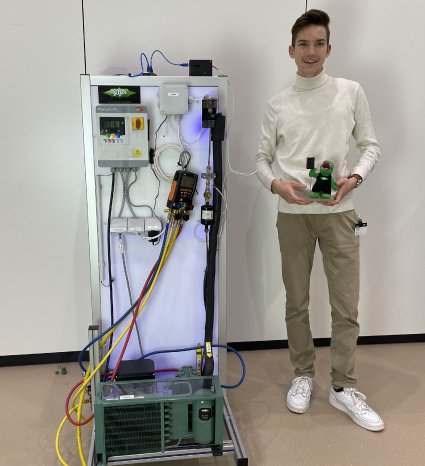BITZER is one of the leading manufacturers of components in the refrigeration and air conditioning industry, which makes research indispensable. But the long-standing company based in Sindelfingen also takes knowledge transfer very seriously, which is why the SCHAUFLER Academy, the international BITZER training centre in Rottenburg, trains industry specialists and acquaints students and pupils with refrigeration and air conditioning technology. Just such a ‘Jugend forscht’ project with pupils has resulted in an important research project entitled ‘Monitoring refrigerant circuits in the field’.
Florian Stupp, who attends a grammar school in the city of Böblingen close to the BITZER headquarters, is the leading light of this project. The 16-year-old is passionate about research and has already taken part in numerous competitions and technical project assignments. In 2020 for example, he was the regional winner in the ‘Jugend forscht’ competition with his emergency call system for skiers. Now, as this year’s regional winner in technology, he’s advancing to Baden-Württemberg’s ‘Jugend forscht’ state competition with his current project. He has also won two special prizes for his work.
‘Through my school, we had a workshop at the SCHAUFLER Academy in 2019 dedicated to the BITZER company and refrigeration, where we came up with potential project ideas for “Jugend forscht”,’ he explains. ‘And that’s where the idea for my current project originated.’ A short time later, Florian Stupp and Volker Stamer, Director of the SCHAUFLER Academy, agreed on the specific topic and defined the project structure, which was followed by experiments, tests and concepts on implementation and programming. The developed content for detecting bubbles in liquids was then tested at a refrigerant circuit at the SCHAUFLER Academy.
The project: monitoring refrigerant circuits in the field
Small companies with high cooling demands such as bakeries and butcher’s shops rarely have consistently monitored cooling systems. But monitoring can prevent system errors and refrigerant leaks, which can be harmful to the environment and health. This is where Florian Stupp’s project comes in: to make monitoring systems affordable for small companies, he dedicated himself to the sight glass in the refrigerant circuit, as bubbles that form there could be a sign of a potential leak. With the support of the SCHAUFLER Academy, Florian Stupp developed an optical system that can detect the formation of bubbles like these with the aid of a microcontroller and inform the user via an interface.
The system can identify system malfunctions and thus prevent downtime and refrigerant leaks, which are harmful to the environment. ‘We tested the system repeatedly and it’s very reliable when it comes to fast, precise detection of bubble formation in the sight glass,’ adds Volker Stamer. ‘The design is simple and affordable, which means the system can be retrofitted without much effort or investment – and these are essential factors for small companies.’
As an independent specialist for refrigeration and air conditioning technology, BITZER is present all over the world: with products and services for refrigeration, air conditioning and process cooling as well as transport, BITZER ensures optimum temperature conditions for trade in goods, industry processes and indoor climate control – always striving for the highest possible energy efficiency and quality. BITZER is represented all over the world with 72 sites in 37 countries, including its sales companies and production facilities. Trade and service partners included, the BITZER network of manufacturing, development and sales extends to almost all countries in the world. In 2019, 3,800 employees generated a turnover of €808 million; expenditure for research and development totalled €46 million.
Overview of images
Images may only be used for editorial purposes. This usage is free of charge if ‘Photo: BITZER’ – and a free copy of the publication is sent to us. Images may not be modified or altered, except to crop out the background surrounding the main subject.

